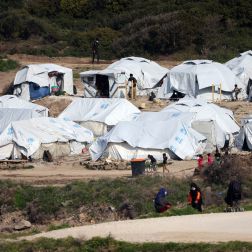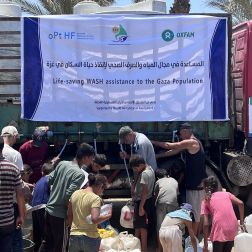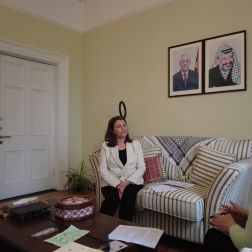- 4 mins read time
- Published: 18th June 2015
There’s no place like home: keeping hope alive for the children of Syria

Above: Oxfam’s Helena O’Donnell with Syrian refugee children in Lebanon. 1 million Syrians have left their home country for Lebanon since the war began.
“Bubbles my dog and my Xbox” was the emphatic response of one young Cork schoolboy when asked what he would miss most from home.
“Minecraft… my bedroom… my trampoline” and “my football” were the other homely comforts for the boys of Scoil an Spioraid Naoimh in Bishopstown, Cork.
I was speaking to the boys about their homes, what they loved most about being at home and what it must feel like for the Syrian children who have had to leave their homes due to war and conflict.
It’s a very sad story to speak to young children about. The war in Syria is in its fifth year and much of the country is now in ruins.
Almost 4 million Syrians have had to flee their country, with over 1 million of these moving to live in refugee camps in neighbouring Lebanon.
On an unusually stormy day in May I was welcomed to Cork by the pupils of Scoil an Spioraid Naoimh, who were eager to hear about the Syrian children they had heard about on the news. The heavy hailstones and rushing wind in the deserted school yard set the mood for the sombre discussion ahead of me.
Loaded with large colour photographs of Syrian children and stories of the families I had met when visiting refugee camps in Lebanon earlier this year, I struggled to think of how I might explain to primary school children the impact of war on boys and girls the same age as themselves.
I shouldn’t have worried. From the moment I arrived, I was greeted with cheers, energy and positivity from the 1st to 6th class boys who were delighted to have the chance to leave their classrooms and convene in their sports hall to talk about soccer, how much they love it, how much Syrian children love soccer and how their pre-loved jerseys would be put to good use by an emerging football team in Lebanon’s Beqaa Valley.

Above: Oxfam’s Helena O’Donnell with some of the pupils of Scoil an Spioraid Naoimh in Bishopstown, Cork, who organised a shipment of sports gear for Syrian refugee children living in Lebanon after hearing news reports about them.
Earlier this year, the big-hearted pupils had been inspired by news reports about Syrian refugee children living in Lebanon and decided to come together and collect all their pre-loved and unused sports jerseys and soccer boots and send them over on a sponsored shipment to the boys and girls of the Al Jalil children’s centre in Beqaa Valley.
When I visited the centre in March, the bright-eyed Syrian children I met told me, through a translator, that they were very happy there and loved to play soccer, play group games like musical chairs and take turns in the arts and crafts room. As I laughed and joked with them it had struck me how much they had seen in their short lives and reflected on how serious a conflict it was to have driven them this huge distance from their homes in Syria.
The Oxfam-funded centre tries to give refugee children, frequently homeless, a space to enjoy the pastimes they loved so much back home. It helps Syrian children, traumatised by what they have seen, to restore some normality and fun to their lives.

Above: Refugee children at the Oxfam-supported Al Jalil children’s centre in Beqaa Valley in Lebanon where activities like soccer and art provide a respite from the day-to-day challenges of being so far from home.
The centre has had huge success forming a mixed gender soccer team. As you can see from my pictures, the boys from Bishopstown, Co Cork are delighted to have the chance to help bring a sense of hope and fun for the refugee children.
As we mark World Refugee Day this Saturday (July 20th), we would like to say a huge well done to everyone at Scoil an Spioraid Naoimh. They have raised vital awareness in their own community about the situation facing Syrian refugees and shown solidarity with displaced communities who have escaped the violence in Syria.
*Thank you to the EU which funded the media trip to Lebanon which generated the news reports mentioned in this article, part of the EUsaveLives campaign. For more information on the project, click here and visit www.eusavelives.org




